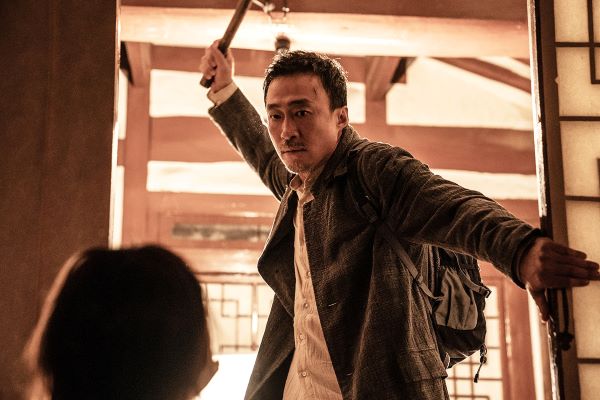When an eye belonging to a demon who was vanquished by the Buddha 2,500 years ago is set free from its prison as the result of a ritual blood sacrifice, it seeks to be reunited with the demon’s other eye by possessing individuals one at a time. If both eyes come together, the demon will awaken and threaten the Earth once more. As a result, novice monk Cheong-seok (Nam Da-reum) is sent to find Park Jin-soo (Lee Seung-min), a former monk with a troubled past, in order to break the possession chain and prevent the demon from rising again. Also hot on the trail is dogged police detective Kim Ho-tae (Park Hae-joon), who alongside his superstitious disabled partner Dong-jin (Kim Dong-yeong). is also tracking the mysterious trail of death left in the wake of the Red Eye.
Director and writer Kim aims for characterisation over scares and special effects, with more emphasis being placed on the relationships between Jin-soo and Cheong-seok as well as Ho-tae and Dong-jin as the characters race to prevent the two eyes from being reunited. In addition, more focus is placed on explaining the circumstances enabling the demon’s imminent resurrection, with the significance of the eyes explained twice during the film’s first act and the order of demonic possession emphasised frequently.
This emphasis on narrative results in a greater level of dimensionality being provided to the characters, with Jin-soo and Ho-tae both learning to appreciate their partners despite their perceived shortcomings. This level of character development is helped by the impressive performances of the cast. In particular, Lee effectively conveys Jin-soo’s gradual transition from weary aloofness to caring for Cheong-seok and in the process confronting traumatic events from his past.
Whilst the scares are somewhat downplayed, the CG and practical effects are impressive, with the possessed victims displaying eerie, Uncanny Valley-esque smiles and a computer-generated facial cut with the Red Eye poking through it.
However, despite these flourishes, the film does suffer from its lack of expected action, with the long stretches in between possession sequences potentially leaving horror fans wanting, and the action sequences themselves lacking any serious amount of gore. This bloodless approach may work for a mainstream fantasy film, but for something advertised as a horror film it seems a somewhat strange omission, particularly considering the demonic possession elements contained within the narrative.
As a result, The 8th Night is an interesting but somewhat confused film, with Kim’s decision to largely forego the expected fast-paced, action-filled structure and content resulting in a meandering pace with a great deal of characterisation and mythological world-building, but little of the stylised blood and gore for which many horror fans hunger. The more patient viewer won’t find much to complain about, but if you’re looking for something more graphic and scary, search elsewhere.
Available on Netflix now
